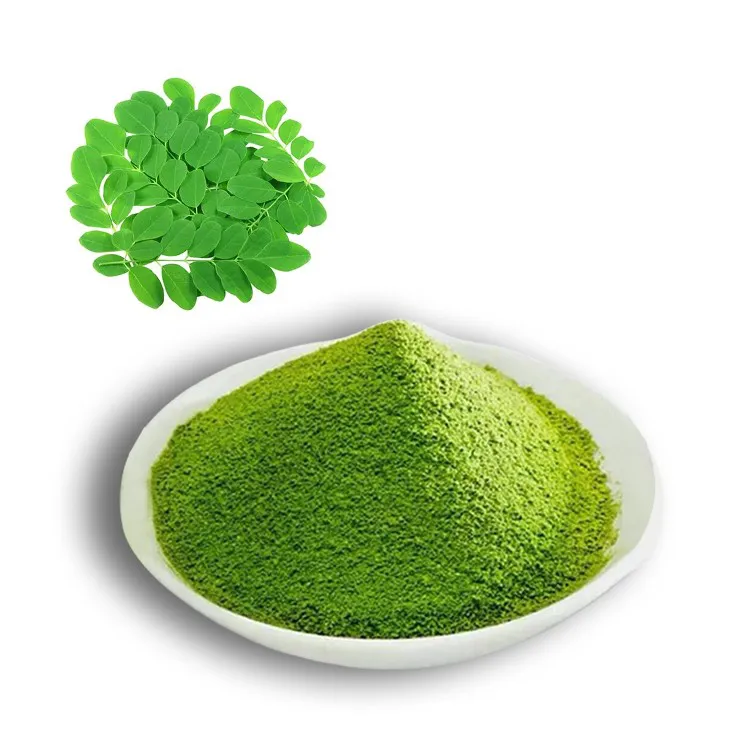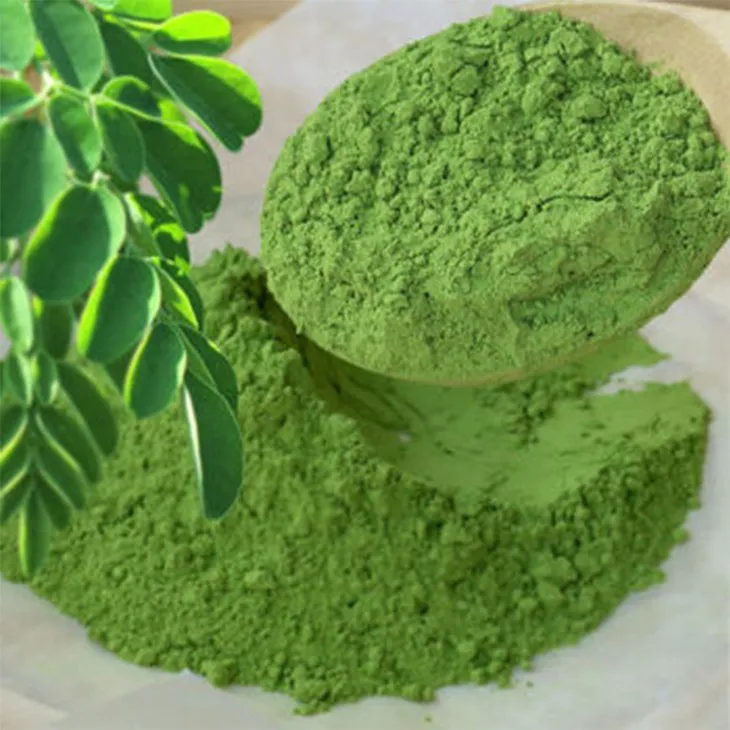- 0086-571-85302990
- sales@greenskybio.com
Is moringa powder beneficial for diabetes? Are these all safe and suitable for diabetic patients?
2024-11-13

1. Introduction
Diabetes has emerged as a significant global health concern, affecting millions of people worldwide. With the growing interest in natural remedies, Moringa powder has caught the attention of many, including those with diabetes. Moringa oleifera, from which Moringa powder is derived, is a plant native to parts of Africa and Asia. It has been used in traditional medicine for various purposes. This article aims to comprehensively analyze whether Moringa powder is beneficial for diabetes and its safety for diabetic patients.

2. Nutritional Composition of Moringa Powder
Moringa powder is rich in several nutrients that could potentially have an impact on diabetes management.
2.1 Vitamins
It contains vitamins such as vitamin C, which is an antioxidant that may help protect cells from damage. Vitamin A is also present, which is important for overall health. These vitamins can play a role in maintaining a healthy immune system, which is crucial for diabetic patients as they are more prone to infections.
2.2 Minerals
- Moringa powder is a good source of magnesium. Magnesium is involved in glucose metabolism. Adequate magnesium levels may help improve insulin sensitivity, which is a key factor in diabetes management.
- It also contains potassium. Potassium helps in maintaining proper heart function and fluid balance in the body. For diabetic patients, proper heart function and fluid balance are essential as they are at a higher risk of heart disease and kidney problems.
2.3 Protein
The presence of protein in moringa powder can be beneficial. Protein has a lower glycemic index compared to carbohydrates. Consuming moringa powder can provide a source of slow - releasing energy, which can help in preventing sudden spikes in blood sugar levels.

3. Potential Benefits of Moringa Powder for Diabetes
3.1 Blood Sugar Regulation
Some studies suggest that moringa powder may have hypoglycemic effects. It may help in reducing blood sugar levels through various mechanisms. For instance, certain compounds in moringa may enhance insulin secretion from the pancreas. Insulin is the hormone responsible for transporting glucose from the blood into cells for energy. By increasing insulin secretion, moringa powder can potentially lower blood glucose levels.
3.2 Anti - inflammatory Properties
Chronic inflammation is often associated with diabetes. Moringa powder has anti - inflammatory properties due to the presence of bioactive compounds such as flavonoids and phenolic acids. Reducing inflammation in the body can be beneficial for diabetic patients as it may help in improving insulin sensitivity and reducing the risk of complications associated with diabetes, such as heart disease and nerve damage.
3.3 Antioxidant Activity
As mentioned earlier, moringa powder contains antioxidants like vitamin C. These antioxidants can scavenge free radicals in the body. Free radicals are unstable molecules that can cause damage to cells, including pancreatic cells that produce insulin. By reducing oxidative stress, moringa powder may help protect pancreatic cells and improve insulin production and function.

4. Safety Considerations for Diabetic Patients
4.1 Interaction with Medications
- One of the major concerns is the potential interaction of moringa powder with diabetes medications. Diabetic patients often take medications such as metformin or insulin. Moringa may interact with these medications and either enhance or reduce their effectiveness. For example, if moringa powder has a significant hypoglycemic effect on its own and is combined with insulin, it could lead to dangerously low blood sugar levels (hypoglycemia).
- It is crucial for diabetic patients to consult their healthcare providers before starting to take moringa powder, especially if they are on multiple medications.
4.2 Allergic Reactions
- Some individuals may be allergic to moringa. Allergic reactions can range from mild symptoms such as skin rashes and itching to more severe symptoms like difficulty breathing and anaphylactic shock. Diabetic patients should be aware of the possibility of an allergic reaction when considering using moringa powder.
- If a patient has a history of allergies to plants in the same family as moringa or has had previous allergic reactions to herbal products, they should avoid moringa powder.
4.3 Purity and Quality of Moringa Powder
- The market for moringa powder is not highly regulated in some areas. There is a risk of contamination with heavy metals, pesticides, or other harmful substances. Diabetic patients, who may already have compromised immune systems and organ function, need to ensure that the moringa powder they consume is of high quality and purity.
- When purchasing moringa powder, it is advisable to choose products from reliable sources that follow good manufacturing practices. Look for certifications or quality assurances on the product label.
5. Research and Studies on Moringa Powder and Diabetes
- Although there have been some in - vitro and animal studies suggesting the beneficial effects of moringa powder on diabetes, human clinical trials are still relatively limited. The existing animal studies have shown promising results in terms of blood sugar regulation and improvement of insulin sensitivity. However, translating these results to humans is not always straightforward.
- Some small - scale human studies have indicated that moringa powder may have a positive impact on blood glucose levels. For example, a study involving a group of pre - diabetic individuals found that regular consumption of moringa powder led to a slight reduction in fasting blood sugar levels over a certain period. But more large - scale, long - term human studies are needed to confirm these findings and establish the safety and effectiveness of moringa powder for diabetes management.
6. Conclusion
Moringa powder has a nutritional profile that contains elements which could potentially be beneficial for diabetes management, such as vitamins, minerals, and protein. It may also have properties like blood sugar regulation, anti - inflammatory, and antioxidant activities. However, there are significant safety considerations for diabetic patients, including potential interactions with medications, allergic reactions, and concerns about the purity and quality of the product. While the available research shows some promise, more comprehensive human studies are required. In conclusion, diabetic patients should approach the use of moringa powder with caution and always consult their healthcare providers before adding it to their diabetes management regimen.
FAQ:
1. What are the main components in Moringa powder that might be related to diabetes?
Moringa powder contains various components such as vitamins (like vitamin C, which may help with antioxidant protection), minerals (including magnesium that can play a role in glucose metabolism), and bioactive compounds. Some of these bioactive compounds, like flavonoids, have been shown in some studies to have potential effects on blood sugar regulation. However, more research is needed to fully understand how these components interact and affect diabetes specifically.
2. How might Moringa powder affect blood sugar levels?
There are some indications that Moringa powder could potentially help regulate blood sugar levels. It may improve insulin sensitivity, which means the body can use insulin more effectively to take up glucose from the blood. Some animal studies have shown that certain compounds in Moringa can lower blood glucose levels. But in humans, the evidence is not yet conclusive. Diabetic patients should not rely solely on Moringa powder to control their blood sugar and should still follow medical advice.
3. Is Moringa powder safe for all diabetic patients?
Moringa powder is generally considered safe for most people when consumed in moderation. However, some diabetic patients may have underlying health conditions or be taking medications that could interact with Moringa. For example, if a diabetic patient is on blood - thinning medications, Moringa, which also has some blood - thinning properties, could potentially increase the risk of bleeding. So, it's important for diabetic patients to consult their doctor before starting to use Moringa powder.
4. Can Moringa powder replace diabetes medications?
No. Moringa powder is not a substitute for diabetes medications. While it may show some potential benefits for blood sugar control, current diabetes medications are specifically formulated and tested to manage blood sugar levels effectively. Diabetic patients should continue to take their prescribed medications as directed by their healthcare provider and only consider adding Moringa powder as a complementary measure after consulting their doctor.
5. How much Moringa powder is safe for diabetic patients to consume?
There is no standard recommended dosage of Moringa powder specifically for diabetic patients. In general, starting with a small amount, such as 1 - 2 teaspoons per day, and gradually increasing while observing for any adverse effects is a reasonable approach. But again, it's crucial for diabetic patients to consult their doctor or a nutritionist to determine an appropriate amount based on their individual health status, including factors like other medications they are taking and their overall diet.
Related literature
- The Potential of Moringa oleifera in Diabetes Management: A Review of the Current Evidence"
- "Moringa oleifera and Its Impact on Metabolic Disorders, with a Focus on Diabetes"
- "Beneficial Effects of Moringa oleifera on Glucose Homeostasis: Pre - clinical and Clinical Perspectives"
- ▶ Hesperidin
- ▶ citrus bioflavonoids
- ▶ plant extract
- ▶ lycopene
- ▶ Diosmin
- ▶ Grape seed extract
- ▶ Sea buckthorn Juice Powder
- ▶ Beetroot powder
- ▶ Hops Extract
- ▶ Artichoke Extract
- ▶ Reishi mushroom extract
- ▶ Astaxanthin
- ▶ Green Tea Extract
- ▶ Curcumin Extract
- ▶ Horse Chestnut Extract
- ▶ Other Problems
- ▶ Boswellia Serrata Extract
- ▶ Resveratrol Extract
- ▶ Marigold Extract
- ▶ Grape Leaf Extract
- ▶ blog3
- ▶ blog4
- ▶ blog5
-
Organic Tongkat Ali extract powder factory.
2024-11-13
-
How to make powder with ashwagandha extract.
2024-11-13
-
Rosehip extract manufacturers from China.
2024-11-13
-
The best cat's claw extract in nature.
2024-11-13
-
Chinese Dandelion Leaf Extract Suppliers.
2024-11-13
-
Elderberry Extract
2024-11-13
-
Okra Extract
2024-11-13
-
Grape Seed Extract
2024-11-13
-
Kelp Extract Powder
2024-11-13
-
Soy Extract
2024-11-13
-
Plantain extract
2024-11-13
-
Cassia Seed Extract
2024-11-13
-
Troxerutin
2024-11-13
-
Green Tea Extract
2024-11-13
-
Cat Claw Extract
2024-11-13





















